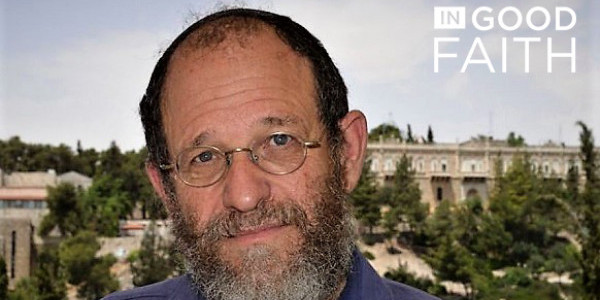Kryzys uchodźczy przypomina nam, jak wszyscy jesteśmy połączeni
World Religious Leaders Address Refugee Crisis september 2015
18/09/2015 | Na stronie od 17/10/2021

Alon Goshen Gottstein - laureat (2009) tytułu Człowiek Pojednania przyznawanego przez Polską Radę Chrześcijan i Żydów osobom spoza Polski, które są szczególnie zasłużone dla dialogu chrześcijańsko-żydowskiego w Polsce, w uznaniu ich wyjątkowego wkładu w dzieło zbliżenia, lepszego poznania i pojednania chrześcijan i Żydów w Polsce.
Źródło: The Muslim Times
By Zia H Shah on September 18, 2015
The refugee crisis reminds us how interconnected we all are Syrian internally displaced people walk in the Atme camp, along the Turkish border in the northwestern Syrian province of Idlib, on March 19, 2013. The conflict in Syria between rebel forces and pro-government troops has killed at least 70,000 people, and forced more than one million Syrians to seek refuge abroad.
Syrian internally displaced people walk in the Atme camp, along the Turkish border in the northwestern Syrian province of Idlib, on March 19, 2013. The conflict in Syria between rebel forces and pro-government troops has killed at least 70,000 people, and forced more than one million Syrians to seek refuge abroad.
Source: Huffington Post
World Religious Leaders Address Refugee Crisis
By Alon Goshen-Gottstein; Founder and Director of the Elijah Interfaith Institute. Acknowledged as one of the world’s leading figures in interreligious dialogue.
A recent statement of the Elijah Board of World Religious Leaders on the refugee crisis gives voice to the perspectives of five major faith traditions, represented by high level religious leadership. Gathering premier religious leaders and helping develop a common voice on contemporary issues is one way that this noted group of religious leaders seeks to make religion a positive and guiding force in today’s world. The group that includes the Dalai Lama, Cardinals and Patriarchs, Chief Rabbis, and leading Imams globally, as well as heads of important Hindu faith communities, has issued its most recent statement addressing global challenges. The statement integrates wisdom perspectives of the different traditions and urges hospitality, prayer and the dignity of the human person as religious imperatives, regardless of political and national circumstances. This wisdom-based statement seeks to provide broad spiritual parameters that specific communities can translate into concrete actions. Here is the statement of the Elijah Board of World Religious Leaders on the refugee crisis.
Statement on the Refugee Crisis
The Elijah Board of World Religious Leaders, September 2015The past few weeks have brought to global attention the crisis of refugees, seeking shelter and a better life, following war, instability, suffering and poverty in their home countries in Africa and the Middle East. The refugee crisis poses fundamental challenges to governments and agencies, seeking to address this humanitarian crisis.
As leaders of all faith traditions, we would like to recall the following spiritual principles as guidelines that should inform the actions, decisions and attitudes of governments and of individuals worldwide:
- The refugee crisis reminds us how interconnected we all are. Political and humanitarian problems cannot be contained in some distant country. Eventually, all problems affect all of humanity, because we are all one. This recognition places a moral responsibility upon us all.
- The refugee crisis reminds us how precarious and unstable our lives are. We are all, in some way, refugees in need of shelter, or we have been at some point in the past, or may be in the future. Religious communities do well to look to their own history and to remember that we have all faced similar challenges in our histories.
- In addressing the crisis, we must remember the face of the Other. The image of the dead body of a young child washed ashore has shocked the conscience of so many because it reflects the suffering of the individual. No matter how large the crisis is in terms of numbers, it is composed of the suffering of so many individuals, and we must recall their humanity. All our religions teach us to uphold the dignity of the human person.
- At the same time, we must uphold the dignity of the community and remember that communities have the right to self-definition and to maintaining the particularity of their identity, based on religious, national and other considerations.
- Compassion must be a driving force of our orientation to all situations. Compassion is an attitude of heart, an openness of being and a willingness to take decisive and positive action impelled by such an attitude.
- The balance between manifesting compassion and maintaining collective communal identity has to be negotiated case by case. However, in all cases we urge that compassion find concrete expression in ways that show support for the suffering of others. Such support should come from all religious communities and from all their members, who should undertake some significant, even if small, expression of support, as a show of common human solidarity and care for others.
- Hospitality to the stranger is a virtue that all our religious traditions recognize. It is a common and universal value. Extending hospitality can be carried out in various ways. We invite religious and communal leaders to reflect on how compassion and hospitality might be extended in this particularly difficult time.
- As a way of maintaining an open heart towards those who are suffering and not allowing various practical considerations from obstructing the flow of compassion and ensuing action, we call on everyone to pray for those in distress. Through our prayers for the refugees, the migrants and those in need, we keep them close to heart and allow ourselves to open up to the inspiration of how we might best serve them and help alleviate their suffering.
For a list of members of the Elijah Board of World Religious Leaders, click here
Follow Alon Goshen-Gottstein on Twitter: